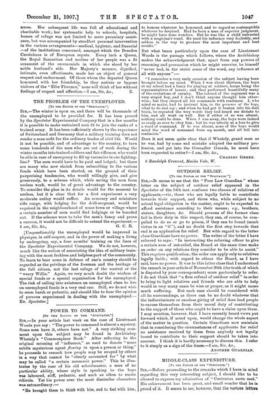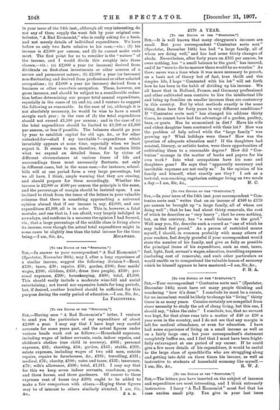MIDDLE-CLASS EXPENDITURE.
[To TER EDITOR OF TER "SPECTATOR."] Sin,—Before proceeding to the remarks which I have in mind regarding this very interesting subject, I should like to be allowed to express my admiration of " Contentus sorte mei." His achievement has been great, and small wonder that he is proud of it. It seems to me, however, thitt the various letter in your issue of the 14th inst., although all very interesting, do not any of them supply the want felt by your original con- tributor, "A Bad Economist," who is really asking for a basis, and not merely details of individual expenditure. We have before us only two facts relative to his case,—viz.: (1) his income is £2,000 per annum, and (2) he cannot make ends meet. The first point for us to consider is the " nature " of the income, and I would divide this roughly into three classes,—viz.: (a) £2,000 a year (or incomes) derived from dividends on first-class investments or other sources of a secure and permanent nature; (b) £2,000 a year (or incomes) non-fluctuating and derived from professional or other salaried occupations ; (c) £2,000 a year (or incomes) derived from a business or other uncertain occupation. These, however, are gross incomes, and should be subject to a considerable reduc- tion before determining our proper total annual expenditure, especially in the cases of (a) and (c), and I venture to suggest the following as reasonable. In the case of (a), although it is not absolutely necessary, he would be wise to have a small margin each year ; in the case of (b) the total expenditure should not exceed £1,500 per annum ; and in the case of (c) the total expenditure should be limited to £1,200 or £1,300 per annum, or less if possible. The balances should go year by year to establish capital for old age, &c., or for other unlooked-for—shall I say inevitable ?—expenditure which invariably appears at some time, especially when we least expect it. It seems to me, therefore, that it matters little what we expend on detailed items, for by virtue of different circumstances at various times of life and surroundings these must necessarily fluctuate, not only in different cases, but in the same case,—for instance, school- bills will at one period form a very large percentage, but we all have, I think, ample warning that they are coming, and• should prepare for them accordingly. Whether the income is £2,000 or £500 per annum the principle is the same, and the percentage of margin should be insisted upon. I am inclined to think from the tenor of the letters in your valuable columns that there is something approaching a universal opinion abroad that if our income is, say, £2,000, and our expenditure £1,999, all is in order. This is, however, a fatal mistake, and one that is, I am afraid, very largely indulged in nowadays, and confirms in a measure the opinion I had formed, viz., that a large percentage of the middle class is living above its income, even though the actual total expenditure might in some cases be slightly less than the total income for the time















































 Previous page
Previous page